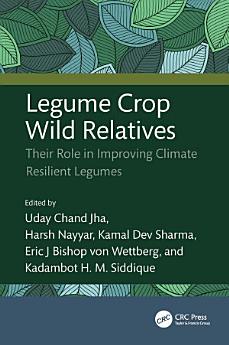Legume Crop Wild Relatives: Their Role in Improving Climate Resilient Legumes
About this ebook
Readers will benefit from new information on various crop wild relatives in grain legumes and how these wild relatives could be explored for novel climate resilience genes for developing future climate-resilient legume crops. They will gain an understanding of how genomic advances (genome sequence, pan genomes) have uncovered the novel genomic regions attributed to climate resilience in various grain legumes. Finally, the critical role of these wild relatives in maintaining the lost gene(s) due to the domestication process will be discussed.
Comprehensive information on conventional breeding, advanced breeding, and recent advances in genomics covering all the major crop wild relatives of legumes is not available in a single book. Thus, this book will provide readers with the latest updates on various information covering all aspects of wild species of legumes.
About the author
Dr. Uday C Jha has been working in the area of grain legume breeding, genetics, and genomics for both biotic and abiotic stress tolerance since 2010 at the Indian Institute of Pulses Research, Kanpur, ICAR, India. He has more than 60 peered reviewed international publications including two edited books published by Springer Nature. He is associated in developing 8 chickpea varieties. He is also serving as subject editor in various journals of international repute.
Dr. Harsh Nayyar is currently a Professor at Panjab University, India. Dr Nayyar has been working on the responses of various food legumes (chickpea, lentil, beans) to drought, cold, heat, salt and metals, for the past 15 years. He has published more than 150 research articles in peer‐reviewed, high‐impact scientific journals. Recently, he was rated among the top 2% of Indian scientists in a global ranking by Stanford University, USA, published in PLOS Biology..
Dr. Kamal Dev Sharma is Professor and Head, Department of Agricultural Biotechnology, CSKHPKV Palampur, India. His area of expertise includes plant genomics and abiotic & biotic stresses of plants with a primary focus on Fusarium wilt and cold stress in chickpea. He has published more than 50 research and review articles in internationally reputed journals, along with several book chapters.
Dr. Eric J Bishop von Wettberg is Professor at the University of Vermont. He has vast experience in conducting research in areas of population genomics, domestication of legumes, symbiosis, conservation genetics, landscape genetics, and symbiont and microbial mediation of plant traits. He serves as editorial board member for various international jpurnals. He has more than 100 peered reviewed publications in reputed journals.
Professor Kadambot H.M. Siddique has more than 35 years of experience in agricultural research, teaching, and management in both Australia and overseas. He has developed a national and international reputation in agricultural science especially in the fields of crop physiology, production agronomy, farming systems, genetic resources, and breeding research in cereal, grain and pasture legumes, and oilseed crops. He is the Hackett Professor of Agriculture Chair and Director of The UWA Institute of Agriculture at The University of Western Australia. Professor Siddique is a Highly Cited Researcher in two fields, agricultural science and plant and animal science (Clarivate).




